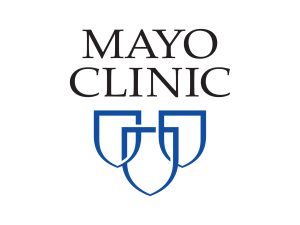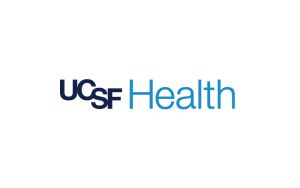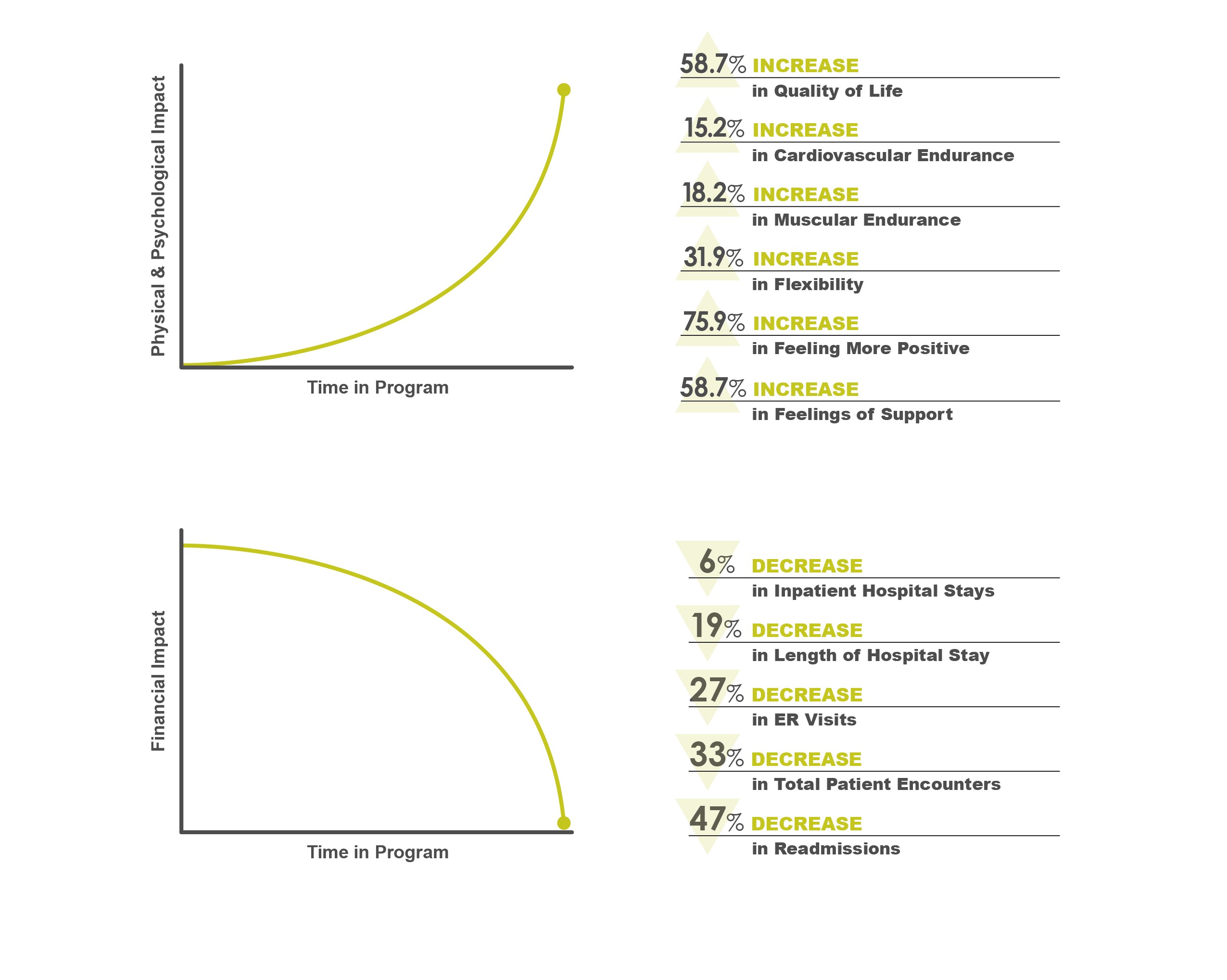At Maple Tree Cancer Alliance®, we are committed to providing evidence-based exercise programs that are strategically designed to improve the quality of lives of individuals battling cancer.
We collaborate with several research institutions across the country to assist in their work. Our trained and certified Exercise Oncology Instructors serve as the workforce for these studies executing the exercise protocols under the direction of the respective Principal Investigator.
We currently are serving in this capacity at the following research institutions:




In addition, we have developed our own robust research program to measure patient outcomes and health care utilization. Maple Tree Cancer Alliance has created a unique phase system of exercise oncology that our patients progress through as they complete their treatment journey.
The following charts represent the outcomes data we have measured on our patients who have completed our program at other Maple Tree locations across the country (n=11,328).

PUBLICATIONS
Below is a list of peer-reviewed publications from Maple Tree Cancer Alliance exercise programs:
Wonders, KY, Schmitz KH, Harness JK, Hale R, Lerner AG. (2023). The Benefits of a Clinically Based Individualized Exercise Oncology Program on Quality of Life and Health Care Costs for Early-Stage Breast Cancer Patients. The American Society of Breast Surgeons Official Proceedings: Annual Meeting Scientific Session Abstracts. Ann Surg Oncol 30(2), 259-664.
Wonders, KY, Schmitz KH, Harness JK. (2023). Dose Delays, Dose Reductions, and Relative Total Dose Intensity in Patients with Advanced Cancer Who Exercised During Neoadjuvant Chemotherapy Treatment. Integrative Cancer Therapies.
LoRusso SM, Parry SL, Yahner TP, Wonders KY. (2023). Patient Comments on a Hospital- and University-Based Exercise Oncology Program. J Cancer Educ. 2023 Apr;38(2):639-645.
Wonders, KY, Schmitz KH, Wise R, Hale R. (2022). The Cost-Savings Analysis of an Individualized Exercise Oncology Program In Early Stage Breast Cancer Survivors: A Randomized Clinical Control Trial. J Clin Oncol. 18(7):e1170-1180.
Holmes KK, LoRusso SM, Wisniewski K, Heitzenrater J, Baker S, Wonders KY, Teranashi-Hashimoto C, Yamata P. Six-month Change in Cancer Survivors Ratings of Distress with Pandemic Closure of Exercise Rehabilitation Clinic.
LoRusso, SM, Parry, SL, Yahner TP, Wonders KY. (2022). Patient Comments on a Hospital and University-Based Exercise Oncology Program. Journal of Cancer Education. https://doi.org/10.1007/s13187-022-02168-6
Wonders, KY, Gnau K, & Schmitz KH. (2021). Measuring the Feasibility and Effectiveness of an Individualized Exercise Program Delivered Virtually to Cancer Survivors. Clinical Sports Medicine Reports, 20(5): 271-276.
Wonders, K.Y., Foggia, N., & Wise, R. (2020). Driving Patient Engagement in Exercise Oncology: A Patient’s Journey Through Maple Tree Cancer Alliance. Journal of Clinical Research and Medicine, 3(2): 1-4.
Wonders, K. Y., Stemly, M, Hale, R (2020). A Case Study: Patient Response to 12-week Individualized Exercise Program During Radiation and Chemotherapy Treatment. World Journal of Pharmaceutical and Medical Research,6(8): 303-308.
Wonders, KY., Oostveen, A., Wise, R. (2020). The Role of Prescribed, Individualized Exercise in Attenuating Sleep Disturbance and Deprivation During Cancer Treatment. Sleep Medicine and Disorders: International Journal, 4(1): 1-4.
Wonders, K.Y., Wise, R., Ondreka, D., Gratsch, J. (2019). Cost Savings Analysis of Individualized Exercise Oncology Programs. Integrative Cancer Therapies, 18: 1-8.
Wonders, K.Y. Wise, R., Ondreka, D., Stout, B. (2018). Supervised, Individualized Exercise Programs Help Mitigate Costs During Cancer Treatment. Journal of Palliative Care & Medicine. 8:4. 1000338.
O’Malley, N., Stout, B., & Wonders, K.Y. (2018). The Effects and Efficacy of Exercise in Lung Cancer Patients: An Overview. Health Science Journal, 12 (2): 553.
Wonders, K.Y. & Ondreka, D. (2018). Individualized Exercise Improves Fitness and Psychological Measures to a Greater Extent than Group Exercise During Cancer Treatment. Journal of Palliative Care and Medicine. 1(1): 1001.
Wonders, K.Y., Ondreka, D., Wise, R. (2018). Supervised, Individualized Exercise Mitigates Symptom Severity During Cancer Treatment. Journal of Adenocarcinoma & Osteosarcoma, 3(1): 1-5.
Wonders, KY & Stout, B. (2017). Formalized Exercise Program for Pediatric and Young Adult Cancer Survivors. Australasian Medical Journal, 10(9): 771-773.
Wonders, KY, Spellman, C., Tse, L., Wonders, AW, Stout, B. (2017). Current trends in cancer support within the religious community. Journal of Nursing and Palliative Care, 2(3):3-7.
Wonders, KY, Stout, B (2017). Physical Activity and Nutrition Recommendations for Weight Management during Breast Cancer Treatment. Journal of Nursing and Palliative Care, 2(3):3-7.
Wonders, KY, Stout, B., (2017). Potential benefits of yoga interventions for breast cancer survivors. Yoga Practice & Physiotherapy.J115.
Stout, B., Wonders, KY, Crecelius, A. (2016). The development and feasibility of an at-home, internet-based exercise and nutrition education program in child cancer survivors. MOJ Clinical & Medical Case Reports. 5(4): 00142-00147.
Wonders, KY, Stout, B., Ondreka, D. (2016). Group-based exercise improves fitness parameters in previously sedentary individuals with cancer. International Journal of Innovative Medicine and Health Science (7), 12-16.
Wonders, KY, Stout, B., Ondreka, D. (2016). A model approach to group exercise in cancer survivors. Physical Medicine and Rehabilitation Research.
Wonders, KY., Leedom, E., Sheets, M. (2016). Role of Nutrition and Exercise in the Prevention of the Onset of Cancer. Journal of Palliative Care and Medicine, (6) 1-4.
Sackett, L., Nelson, M., & Wonders, K.Y. (2015). Randomized Controlled Trial on the Effectiveness of Yoga in Breast Cancer Patients Receiving Adjuvant Radiation and/or Chemotherapy Following Breast Surgery. Jacobs Journal of Cancer Science and Research, 1(4): 021-026.
Robichaux, A.M. & Wonders, K.Y. (2015) Nutrition Intervention Strategies to Maintain Body Weight of Head and Neck Cancer Patients. Jacobs Journal of Physical Rehabilitation Medicine, 1(1):1-3.
Moris, C. & Wonders, K.Y. (2015). Concise Review on the Safety of Exercise on Symptoms of Lymphedema. World Journal of Clinical Oncology, 6(4):43-44.
Wonders, KY (2014). The Effect of Supervised Exercise Training on Chemotherapy-Induced Peripheral Neuropathy. International Journal of Physical Medicine and Rehabilitation. 2:(4) 210-215.
Wonders, KY, Bergman, D., & Drury, DG (2014). An Investigation of the Maxagrip Handle Design on Muscular Strength and Gripping Comfort: A Pilot Study. Journal of Exercise Physiology, Online. 17(3):46-57.
Wonders, KY, Whisler, G., Loy, H., Holt, B., Bohachek, K., Wise, R. (2013). Ten Weeks of Home-Based Exercise Attenuates Symptoms of Chemotherapy-Induced Peripheral Neuropathy in Breast Cancer Patients. Health Psychology Research Journal, 1(3):149-153.
Wonders, KY, Loy, H., Holt, B., Bohachek, K., Wise, R. (2013). Examining the Relationship Between Physical Fitness and Spiritual Fitness in Cancer Patients. World Journal of Translational Medicine, 2(2): 22-26.
Wonders, KY, Jennings, J, & Smith, K. (2012). A Comprehensive Cancer Care Plan: Examining the Role of Exercise, Nutrition, and Emotional Support in Cancer Recovery. Journal of Palliative Care and Medicine, S1:003
Wonders, KY & Drury, DG (2012). Current exercise behaviors of breast cancer patients diagnosed with chemotherapy-induced peripheral neuropathy. Journal of Integrative Oncology, 1(1): 103-107.
Wonders, KY & Drury, DG. (2011). Exercise intensity as a determinant of exercise induced hypoalgesia. Journal of Exercise Physiology online,14(4):134-144
